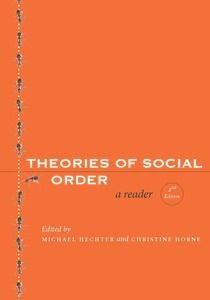Supplemental Readings
Individuals
The readings in this section focus on social meaning. The problem for these theorists lies not in overcoming individual self-interest, but in helping individuals to share the same understandings and, in turn, to be able to coordinate.
Becker, Howard S. 1953. “Becoming a Marihuana User.” American Journal of Sociology 59(3): 235-242.
Chwe, Michael Suk-Young. 2001. Rational Ritual: Culture, Coordination, and Common Knowledge. Princeton, N.J.: Princeton University Press. A game-theoretic analysis of meaning as the production of common knowledge.
Douglas, Mary 1966. Purity and Danger: An Analysis of Concepts of Pollution and Taboo. London: Routledge & Kegan Paul. On the social construction of Hebrew dietary laws.
Henrich, Joseph, Robert Boyd, Samuel Bowles, Colin Camerer, Ernst Fehr, Herbert Gintis, and Richard McElreath. 2001. “Cooperation, Reciprocity and Punishment in Fifteen Small-scale Societies.” American Economic Review, 91:73-78. Presents the results of field experiments in 15 cultures. The data show that groups react to the same incentive structures differently. The authors argue that people make decisions about how to behave in the experiment by comparing the experimental situation to more familiar circumstances. Their interpretation of the experimental setting varies depending on the extent to which groups depend on cooperation for economic well-being, and the extent to which people are integrated into the market.
Mauss, Marcel. Seasonal Variations of the Eskimo: A Study in Social Morphology. A classic analysis of the influence of environmental factors on social construction by Durkheim’s nephew — a seminal theorist in anthropology.
